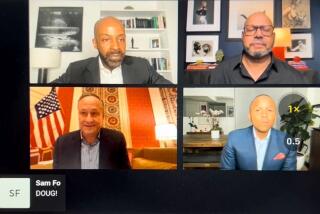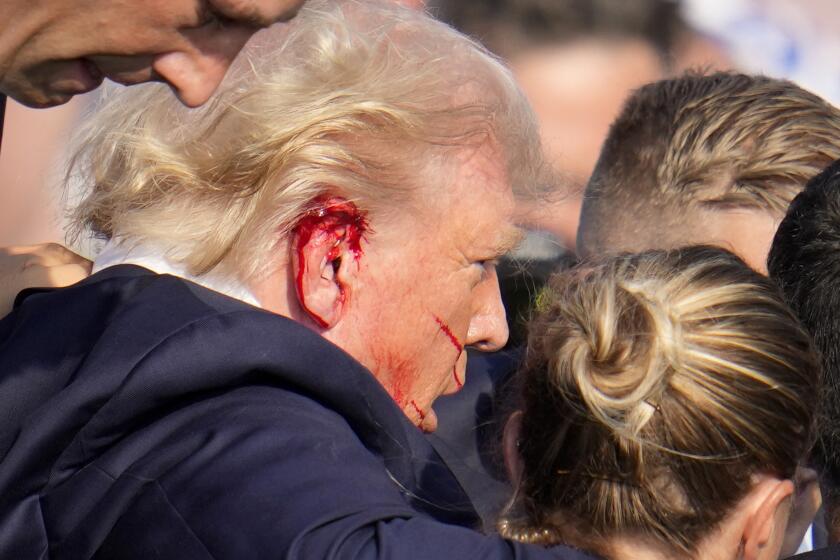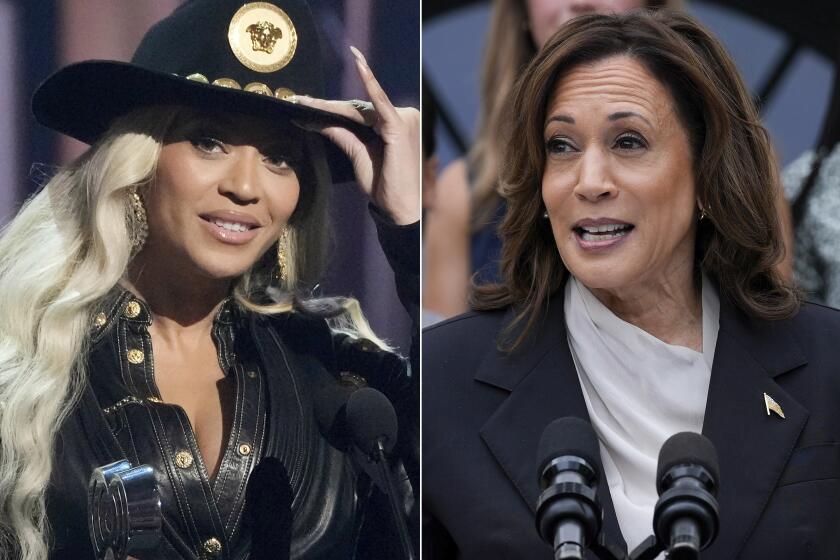Schwarzenegger campaigns quietly for ballot measures
With Gov. Arnold Schwarzenegger’s popularity at a low ebb and a slate of ballot measures he is championing trailing in the polls, the onetime master of Hollywood marketing is stepping back from the spotlight, campaigning as part of a broad coalition rather than the star player he has often been in the past.
The strategy is a reversal of the governor’s last effort in a special election for a set of initiatives that would have transformed state government. He served as the public face of that ill-fated campaign four years ago, ultimately pulling commercials featuring himself off the air.
This time, the governor will raise money and appear at news conferences with other leaders -- such as one Friday with Los Angeles Mayor Antonio Villaraigosa, L.A. County Sheriff Lee Baca and the Los Angeles Area Chamber of Commerce -- who are endorsing six initiatives on the May 19 ballot that he says will help fix the state’s budget system.
“You can’t use a sitting governor whose job approval ratings have plummeted into the 30s as an effective salesperson,” said Garry South, a Democratic strategist who is not working for either side. “People understand it was the politicians who brought about this perilous fiscal state of affairs, and . . . who slapped these things on the ballot to help get the state out of the mess they created.”
Though the initiatives are crucial for the state’s finances and his own legacy, political analysts say Schwarzenegger will surely leave the most personal appeals, especially on television ads during the heat of the campaign, to sympathetic figures such as teachers, firefighters and paramedics. They can talk with credibility, the thinking goes, about the dire consequences for average Californians if the initiatives fail.
The challenge for supporters is significant: They must persuade people who are disenchanted with government to go out in the middle of May and vote for a set of complicated ballot measures that will raise their taxes.
A large infusion of cash by opponents could prove insurmountable.
With less than six weeks to go, Schwarzenegger and his advisors have been working behind the scenes to raise at least $15 million for the short campaign and to persuade unions holding big war chests not to fund the opposition. The governor has made the rounds with legislative leaders at newspaper editorial boards.
‘Bigger than me’
Schwarzenegger, who recently took five days off for a family vacation in Hawaii and left California again over the weekend, says he will campaign “up and down” the state in the coming weeks as part of a bipartisan coalition. But the election, he maintains, is not about him.
“It’s about the state of California,” Schwarzenegger said. “We’ll be asking all the local leaders to help us sell and communicate to the people of California the importance of making those initiatives pass: Democrats and Republicans, the legislators, business leaders, community leaders, law enforcement, education leaders. . . . It’s all about the future of California. California is much bigger than me.”
The initiatives, Propositions 1A through 1F, were hashed out by Schwarzenegger and lawmakers during the budget deal in February, which closed a projected $42-billion deficit after three months of stalemate. Their failure in May would add $6 billion to the deficit this year and plunge state government into chaos again.
The measures would increase the size of the state’s rainy day fund and try to keep future spending in check, extend by two years the temporary tax hikes recently signed into law, boost education funding down the road to compensate for current cuts, borrow $5 billion against the lottery and reduce voter-approved funds for early child education and mental health.
“It’s a very difficult package of bills to sell,” said Jon Coupal, president of the Howard Jarvis Taxpayers Assn. and a leading opponent. “All we have to say is 1A means $16 billion in higher taxes.”
A poll taken last month by the Public Policy Institute of California found that only Proposition 1F, which would freeze state elected officials’ pay when a budget is late, had a majority of voter support, at 81%. Relatively few voters were even paying attention, the poll said.
The same survey found that only 33% of voters approved of the Republican governor’s performance and that for the first time, even most Republicans gave him negative reviews.
Mark Baldassare, the policy institute president, said that given those ratings, Schwarzenegger “has to have a supporting cast around him to be successful.” The key, Baldassare said, is bringing along labor and business leaders and signaling to voters “that there is broad-based support and that opposition is more around the edges.”
Courting unions
So far, the California Teachers Assn. has backed the initiatives, one of which would grant future education funding to offset current budget cuts, and donated heavily. The governor and his team will also be trying to recruit other powerful unions, or at least persuade them to stay neutral.
Leaders of the Service Employees International Union, which represents state employees and home healthcare workers, voted to oppose the measures but have not yet signaled how much, if any, they might donate to defeat them. Nor has the state prison guards union, which has fought with Schwarzenegger in recent years over an expired contract, indicated whether it will use its dues-funded arsenal in the campaign.
“We’re having conversations with just about every organization up and down California to help them understand how critical it is that these pass,” said Adam Mendelsohn, a Schwarzenegger campaign advisor.
Likewise, Republican gubernatorial hopefuls Steve Poizner and Meg Whitman both oppose the measures and could supply ample funding to defeat it, but so far have not.
If these big players stay on the sidelines, it will mark another difference from the 2005 special election, when unions for teachers, nurses, firefighters and others spent tens of millions of dollars to defeat ballot measures backed by Schwarzenegger to curb state spending and to change the way legislative districts were drawn and the way teachers received tenure.
“He just said, ‘Trust me, they’re good,’ and he could never explain what they did, and it became all about him,” recalled Tony Quinn, a former Republican consultant. “They had well-funded opposition that made it a referendum on the governor.”
--
More to Read
Get the L.A. Times Politics newsletter
Deeply reported insights into legislation, politics and policy from Sacramento, Washington and beyond. In your inbox three times per week.
You may occasionally receive promotional content from the Los Angeles Times.






